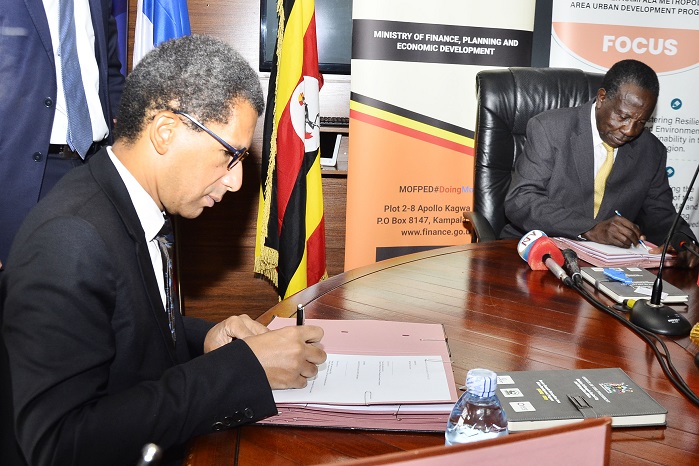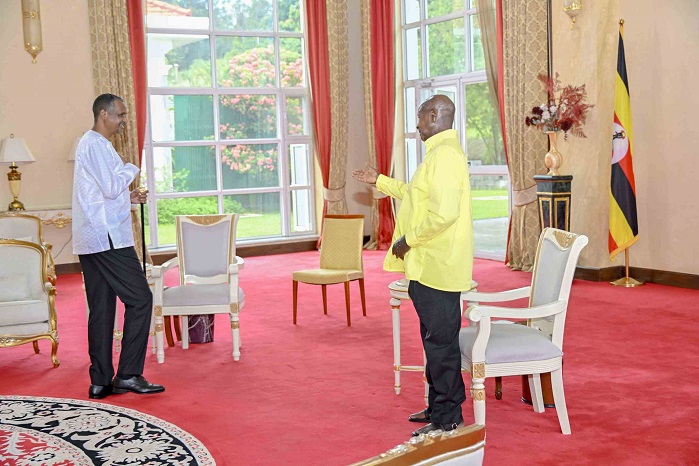
The French Ambassador to Uganda, Xavier Sticker (left) talks and the minister for Finance, Planning and Economic Development, Matia Kasaija sign an agreement during the signing of an agreement in which France funded the expansion of water supply in Kampala Metropolitan at the ministry boardroom Kampala. Photo by Ronnie Kijjambu
The Budget Month
HABARI DAILY I Kampala, Uganda I After a 2-year freeze on extension of development finance to Uganda, the World Bank has accepted to resume extending support to the country, officials have announced.
On August 8, 2023, the World Bank Group released statement saying that Uganda’s Anti-Homosexuality Act fundamentally contradicts the World Bank Group’s values.
According to Patrick Ocailap, the Deputy Secretary to the Treasury, the two parties have resolved all the outstanding issues, and have resolved to move together again on issues development.
“The World Bank has aligned their programing with our development agenda and have opened up what they had suspended. They singled out their support to our development agenda, which revolves around Agro-industrialization, Tourism, Mineral Development, and Science, Technology, and Innovation (ATMs) and National Development Plan IV (NDP IV),” he said.
He made the revelation during the launch of the Budget Month for FY 2025/26, at the Uganda media Center recently.
Ocailap, who said under the ATMs and NDPIV, the government aims to grow the economy tenfold from about $50 billion in 2023/24 to $500 billion by 2040, added that in the last 3 meetings they had with World Bank officials, they were happy with the country’s development path, and decided to resume support.
Part of the new World Bank funding will go towards construction of the Standard Gauge Railway (SGR) and other landmark projects in the next financial year.
Ocailap further noted that they are negotiating a new line of development funding with the International Monetary Fund, results of which will be disclosed in the near future.
Significance of funding
It’s on record that the World Bank and International Monetary Fund (IMF) has been funding the bulk of Uganda’s annual budget for several years.
For instance, in the 2022/2023 financial year, the World Bank, through the International Development Association (IDA) provided budget support to Uganda amounting to $618.55m (sh2.3 trillion), representing 49% of the total external loans approved by Parliament during that period.
They are particularly supportive of the developments in the oil and gas sector that are expected to drive growth in the medium term., are anticipated to have positive spillover effects across other sectors of the economy, leading to improvements in public infrastructure, increased private sector activity, and strong net flows of Foreign Direct Investment.
Advent of World Bank pull out
In 2022, the World Bank board dropped a bamb shell, saying they are no longer interested in extending development funding to a country which disrespects human rights.
“We believe our vision to eradicate poverty on a livable planet can only succeed if it includes everyone irrespective of race, gender, or sexuality. Uganda’s anti Homosexuality law undermines those efforts. Inclusion and non-discrimination sit at the heart of our work around the world,” it said in a statement.
It further said that immediately after the law was enacted, the World Bank deployed a team to Uganda to review their portfolio in the context of the new legislation.
“That review determined additional measures are necessary to ensure projects are implemented in alignment with our environmental and social standards. Our goal is to protect sexual and gender minorities from discrimination and exclusion in the projects we finance. These measures are currently under discussion with the authorities.”
It concluded by saying that no new public financing to Uganda will be presented to our Board of Executive Directors until the efficacy of the additional measures had been tested.




